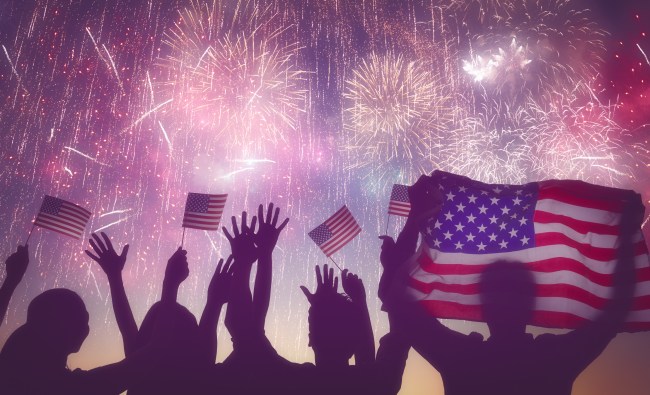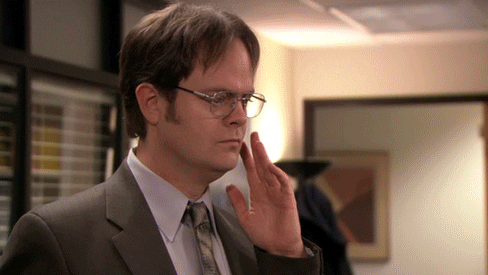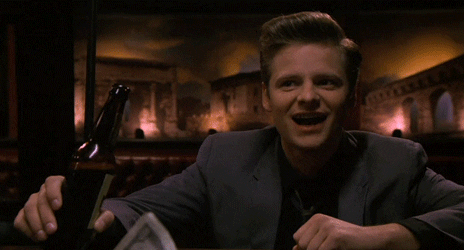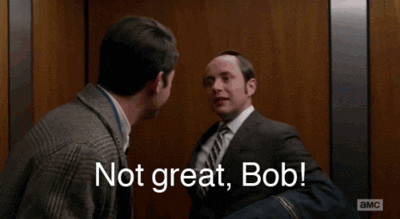
iStockphoto / Choreograph
The Fourth of July is a wonderful time to embark on a great many things but we’d be remiss to not take some time to look back at our country’s great history. A fun fact about looking back is that it’s super easy to do with a drink in your hand, which is a great bonus.
There was a presidential election a couple of years ago, and during that election, a big topic of conversation was the goal of making America great again. It was an easy phrase to say and even yell out if you felt so inclined. But as a question, it was one that proved difficult to answer, which The Daily Show found out when they talked with Trump supporters in 2016.
Okay, so we’re going to make America great again? Cool. But when exactly was America great? The short answer is that it’s complicated.
With that said, let’s try to figure out which one of America’s years was the best. It’s not an easy task, as we have plenty to choose from—especially if we decide to go all the way back to when Columbus “discovered” the New World.
However, I took the time to narrow things down a bit before putting together this handy bracket.

Our top seeds are 1492, 1776, 1789, and 1865—let’s give them all a hand—and in all, there are 32 years in the running for the title of America’s Best Year.
If you’re curious, the 32 were chosen after extensive and thorough research of America’s history (and by “extensive and thorough” I mean I Googled the bejesus out of American history and came up with these 32 years).
I even made a spreadsheet. Why? Because I care.
As was the case with the Greatest HBO Character of All Time tournament, there will be somewhat of a scoring rubric in place; a way to effectively pick winners.
What we’re going to do here is take a look at the pros and cons of each year, governing this tournament with a system of checks and balances that would make the Founding Fathers proud.
Let’s say a year included some especially wonderful things involving civil rights or granting a portion of the population the right to vote. That’s awesome. But if that year also included a black eye like racism or a massive dust storm, that’s a knock against it, and as a result, not so awesome.
And thus we have a quality scoring rubric.
Let’s go!
The Revolutionary Era
1492 (1) vs. 1892 (8)
Little known geographic wanderer (and noted asshole) Christopher Columbus was out on the high seas, doing some exploring and found himself discovering the land that would become America. Or part of America. Whatever.
Of course, he wasn’t the first European to hit our wonderful shores. That was Leif Erickson in the 11th century, but come on, that was like, so long ago.
Columbus’ landing started a long-lasting love affair between America and Europe, a love affair that has found itself a little on the rocks as of late. Disagreements about money will always mess up a friendship.
As for 1892, basketball was invented in Springfield, Massachusetts by a gym teacher looking to find ways to keep his students from killing each other during the frigid New England winter months.
Sure, basketball is dope but America is more dope. Plus, there was an oil fire in a town called Oil City, Pennsylvania that killed 130 people. I don’t know why but that little factoid just kind of stuck out to me.
1492 moves on.
1920 (2) vs. 1869 (7)
Okay, 1920 is one of the years that is a damn near mountain range of positives and negatives so let’s lay out one of each.
A positive: women were allowed the right to vote with the passing of the 19th Amendment.
A negative: The 18th Amendment, which laid the groundwork for Prohibition and officially kicked into gear in January of 1920.
Mobsters, dude. It led to mobsters.
I’m not going to say those things cancel each other out, but I will say that when put up against a year where the main claim to fame is the first college football game, 1869 doesn’t stand a chance.
1920 also gets some credit for being the year when you were no longer allowed to use the United States Postal Service to send your child in the mail (even though I kind of wish that was still legal).
1920 advances.
1814 (3) vs. 1773 (6)
Under the exploding skies of the Battle of Baltimore during the War of 1812, Francis Scott Key scribbled down the words to the Star-Spangled Banner, America’s very own Stairway to Heaven. You get a lot of points for writing a classic.
1773, on the other hand, is a effin’ wrecking ball and I’m questioning seeding it at six.
The Boston Tea Party happened in 1773 as a response to the Tea Act, which was some shady business by the Brits meant to prop up the East India Trading Company. As we all know, the Tea Party helped light the fuse for the American Revolution.
Damn. A six-seed, Ryan? Such a questionable decision would surely have had me committed to the Public Hospital for Persons of Insane or Disordered Minds, the first asylum in America, which opened in 1773 in Williamsburg, Virginia.
Songs are cool and all but parties that lead to revolutions that lead to countries are cooler in my opinion.
Upset!
1774 (4) vs. 2008 (5)
It’s not exactly bold to say that America has a sketchy history when it comes to race.

- GIPHY
So an African American being elected president is a big effin’ deal. The high point in our history in 1774 was that a measly three states (Rhode Island, Georgia and Connecticut) banned the importing of slaves, which makes Obama’s election look even more significant.
2008 advances.
1492 (1) vs. 2008 (5)
You know, as far as Columbus goes, I’ll give him this: finding America is an achievement.
But, and this is kind of a biggie, the dude got here by accident. He was actually shooting for Japan, which, and I don’t even need to consult a map here, is nowhere near the Bahamas, which is where Columbus landed.
What the hell, Chris? You weren’t even headed in the right direction. Oh wait, you didn’t know America was there. Or you did? Either way, Columbus stumbled onto America, thought it was sweet, then proceeded to either kill or enslave every native person he came across.
So in closing, Christopher Columbus was a dick.
1492 is out.
1920 (2) vs. 1773 (6)
The Tea Party led to the Revolution and the founding of America, the establishing of a new democracy in which the government was the voice of the people. That sounds wonderful and is a fantastic sequence of events.
Noticeably absent, though, is the part where it’s mentioned that the people given a voice at the time were just the men.
A fun fact about America is that women live here too. Yeah, it’s true.
It’s not like the brave revolutionaries involved in the Tea Party knew their actions would lead to a country that ignored half of the population (even more if you count minorities) but women being given the right to vote is a big effin’ deal.
1920 has some other cards up its sleeve too; cards like this one: the population of the United States surpassed 100 million people in 1920. Heyyo! Look out world!
1920 moves on.
1920 (2) vs. 2008 (5)
And in the Revolutionary Era portion of the bracket, the white dudes were left to sit and wait.

- GIPHY
The winner of this region will either be a year where women earned the right to vote or a year when an African American became President.
Man, talk about a tough one.
Unfortunately for 2008, such things as the near-collapse of the United States auto industry, the deaths of George Carlin and Paul Newman, and the emergence of Sarah Palin (Tina Fey impression aside) are negatives that start to add up.
And while yes, the Red Sox did trade Babe Ruth in 1920—something that, as a Red Sox fan, I take as a shot across the bow—it kind of pales in comparison to our currency and financial system almost going down the shitter.
1920 advances.
The Roaring 20’s
1776 (1) vs. 1752 (8)
1776 is just sitting there looking like a boss.
1752’s best shot? Ben Franklin walked out in a lightning storm, flew a kite with a key attached to it, nearly got electrocuted, and determined that lightning was electricity.
Now, of course, that’s an accomplishment and I don’t mean to diminish it, but this is 1776 we are talking about here. The world’s first submarine attack happened in 1776 as the Turtle, a U.S. submersible ship, attempted to attach a bomb to the hull of the HMS Eagle, a British ship in New York harbor.
Oh, and the Declaration of Independence was approved by the publisher.
Not too shabby, 1776. Not too shabby at all.
1776 advances.
1947 (2) vs. 2000 (7)
One thing ended in one of these years while another thing didn’t end in the other. Can you guess? No? You probably didn’t even try.
Segregation ended in baseball in 1947 as Jackie Robinson was signed by the Brooklyn Dodgers. Meanwhile, the world didn’t end in 2000, which was rumored to happen by more than one or two people you were friends with at the time.
We are honoring accomplishments here and doing something—which is what happened in 1947—as opposed to not doing something—which the world technically didn’t do in 2000—wins out here.
1844 (3) vs. 1781 (6)
If you created a way to communicate with someone, what would your first communication be? Well, the founder of Twitter, Jack Dorsey, cut straight to the chase when christening his new communication device.
just setting up my twttr
— jack (@jack) March 21, 2006
Clear cut and informative.
When Samuel Morse sat down to compose his first telegram, which he did in 1844, he decided to strike a noticeably different tone than Dorsey, as the first transmission sent via telegraph was “What hath God wrought.”
Either way, without the telegraph, there definitely isn’t Twitter and that might be the worst possible case made for the importance of the telegraph (or the best, depending on how you feel about history).
How you feel about history probably also dictates how you feel about this matchup because 1781 is a sneaky big year historically. The American Revolution essentially ended in 1781 with the British formally surrendering to General George Washington at Yorktown.
We did it! We won.

- GIPHY
It probably would have been great to tell someone not in your immediate proximity right away that the war was over, right? If only Morse had come along sooner.
1844 edges out 1781.
1847 (4) vs. 1964 (5)
Speaking of inventors, Thomas Edison, the man behind the phonograph, the motion picture camera, and the long-lasting light bulb, was born in mid-February and the world would be markedly better thanks to the work he’d go on to do.
Did you know that Edison owned over 1,000 patents? I don’t have any patents. Like, zero. My life is a disaster.
But hold up. It looks like I’m not the only one getting disappointing news because this just in: 1847 isn’t going to beat 1964.
1964 is a real Hulkbuster of a year. It’s moving on and will face a real test in 1776, so I want to save some ammunition. But I’ll give you this little nugget: Dr. Martin Luther King was awarded the Nobel Peace Prize in 1964, making him the youngest person ever to receive the award.
Also in 1964? America met the Beatles.
We have a winner.
1776 (1) vs. 1964 (5)
I mean, 1776 was the year America became America. I don’t want to get too ahead of myself, but wouldn’t that make 1776 a tough year to beat? Is this just a race for second place? Should I just stop now? Have you stopped now? Can anyone even hear me?
Sorry. Back on track.
Let’s be honest: 1776 wins this region. 1964 was definitely a worthy competitor, though.
As I mentioned, America got its first taste of the Beatles that year when they performed on The Ed Sullivan Show and there was also an addition made to the Civil Rights Bill that banned discrimination in jobs, voting booths, and accommodations. You can’t sleep on 1964.
It’s kind of a bummer that the U.S. government started putting together a plan to bomb North Vietnam that same year and there was also the Panama Canal Incident, where four U.S. servicemen died at the hands of a Panamanian mob. So far 1776 is rolling with impunity and those blemishes on 1964’s record are damaging enough.
As for the other years left to face 1776?
1947? Dude, they started the Doomsday Clock.
1844? Eh, still can’t step to 1776.
1776 advances.
The Postwar Boom Era
1865 (1) vs. 1897 (8)
It was a big year for good old Boston in 1897.
Not only was America’s first subway opened but the first Boston Marathon was run. Coincidentally, a pharmacist named Felix Hoffman created aspirin, something you’d definitely need if you were to run a marathon. It’s weird how life has a way of working itself out.
However, 1865 was a big year for more than just marathon runners, subway riders, and sufferers of headaches and other aches and pains. The 13th Amendment, passed in 1864, was officially adopted by the United States on December 18, 1865, and with it’s passing, slavery was abolished.
Dude. They ended slavery.
Slavery.
Marathons are ridiculous, subways are frustrating, and well, aspirin is cool but let’s be honest—it’s never around when you need it.
1865 moves on.
1973 (2) vs. 1777 (7)
1973 is our only entry here from the 1970s and it’s kind of a heavy-hitter. Oddly enough, 1777 is the only entry from the 1770s. Crazy, huh? Do they have anything else in common?
Not really.
In 1777, John Adams and Ben Franklin were able to get France involved in the Revolution, one of the war’s biggest turning points. However, 1973 also gets some points for being the year the last U.S. troops finally pulled out of Vietnam.
Also in 1973? Secretariat won the Triple Crown, the first horse to do so in 25 years. Got anything along those lines, 1777?
*1777 stops and thinks for a second*
Well, the Continental Congress dropped the Articles of Confederation, a precursor to the Constitution. They also adopted the stars and stripes look as our national flag.
Not bad.
1777 is going to pull an upset here.
1893 (3) vs. 1803 (6)
Big things happened during these two years. BIG THINGS.
How big you ask?
Well, friend, in 1803 we went out and bought Louisiana and some of its friends, and in doing so, doubled the size of the country. It’s called a power grab. Look it up.
In 1893, Chicago hosted the World’s Fair, or more specifically, the 1893 Chicago World Columbian Exhibition. The event was Chicago’s chance to really make a name for itself and it did, hosting a massive shindig that ran for almost 200 days and featured the debut of the Ferris Wheel.
Roughly 25 million people attended the fair, traveling from all over the country to do so, a country that was bigger because of said purchase of Louisiana.
Due in large part to Erik Larson’s excellent book The Devil in the White City, we know that the massive world’s fair wasn’t the only thing happening in Chicago in 1893. H. H. Holmes, soon to be known as America’s first serial killer, was systematically killing people in a building affectionately called the Murder Castle.
I’m sorry, 1893. We can’t let something like that slide. You get points for hosting a kickass festival but you subsequently lose points if at the same time a psychopath was running around demonically murdering people.
It really is only fair that 1803 moves on.
1969 (4) vs. 1860 (5)
Abraham Lincoln was elected the 16th President in 1860. If we were doing a tournament of President there’s no doubt Honest Abe would be a one-seed.
Unfortunately, 1860 is a five-seed and running up against some pretty tough competition in the form of 1969.
1969 is one of the years where a person my age has to look back and wonder how the hell all that stuff happened in 365 days. I suppose it’s like the last couple of years, where so much is happening that we A) can’t keep track and B) are baffled by the seemingly slow passage of time in contrast to the amount of news being made and reported.
Massive protests, massive music festivals, massive achievements like landing on the moon—1969 had it all.
And while we are in no way ever going to make light of Lincoln’s accomplishments, as a year, 1860 just can’t hang with 1969.
1969 moves on.
Nice.
1865 (1) vs. 1969 (4)
With slavery ending in 1865, it’s hard to make a case for 1969 somehow being a better year here. But hey, we landed on the moon! The moon! Even today that seems like a wild thing to happen and I can’t imagine what it must have been like back then.
With that said, I also can’t imagine what it must have been like to have been a slave and then suddenly granted your freedom; to have the chains removed and to no longer be considered property but a person.
Shit. There’s no way 1865 isn’t going to win here, even if you do consider it has points deducted situation because Lincoln was assassinated in 1865.
However, I kind of think that Lincoln’s assassination actually knocks 1865 off here, but I’m still not sure. Man, this is the first tough one and this is also the first time I need to ask what someone else thinks. So I just did; I asked Elyse, one of the co-hosts of the podcast Differing Opinions on Drake.
She went with 1969. She notes we had cars in that year and America was still racist AF in 1865 even if slavery was abolished, which are both very valid points.
That settles it.
1969 advances. A second one-seed goes down.
1803 (6) vs. 1777 (7)
This is quite the showdown. We’ve got a massive land expansion versus massive gains for the U.S. against the British in the Revolutionary War.
In 1777, the British captured Philadelphia. I lived in Philly for five wonderful years and I love Philly. You take Philly, you take a part of me and that’s not cool.
1803 moves on for completely personal reasons.
1969 (4) vs. 1803 (6)
The moon!
Also, I don’t know if getting bigger was necessarily the best thing for our country. Sometimes small and cozy works better.
1969 wins this one.
The Reconstruction Era
1789 (1) vs. 1836 (8)
Remember the Alamo? Well, I remember the phrase “Remember the Alamo” but honestly, that’s about it.
The Battle of the Alamo happened in 1836, and you know, I’m not sure 1836 should have even made this tournament. Hold on.
*checks something really quick*
Texas wasn’t even part of America in 1836!
Shit. I’m an idiot.
1789 advances easily.
1804 (2) vs. 1607 (7)
Maybe it’s because I was born and raised in Maine but I always thought America really got the party started with the Pilgrims in Plymouth Rock. It turns out that’s not entirely accurate or even a little accurate.
The first settlement in what would be known as America was in Jamestown, Virginia.
I apologize. This was literally news to me.
Three British ships carrying 103 people set up shop in Jamestown in 1607. How did things go? Not too well!
In only a few months, 80 percent of those settlers had died. These settlers weren’t exactly dudes accustomed to getting their hands dirty and thus weren’t all that prepared for living off the land. By the sound of it, they weren’t prepared at all.
They became cannibals!
Cannibals!
Everyone knows that unless it’s specifically Five Young Cannibals, nothing good comes from cannibalism.
Over in 1804, we had our first road-trippers in the form of Lewis and Clark. Thomas Jefferson, the president at the time, asked them to set out, take some notes, and make some maps. It’s as if Jefferson had recently purchased a car and needed to call in his buddies to take a look under the hood to see what he was working with.
While my first reaction is to go with 1804, I think I’m going to defer to the folks down in Jamestown.
Nothing but respect for the OGs.
1933 (3) vs. 1965 (6)
I don’t really care what happened in 1965 because in 1933 they repealed Prohibition, and as a result, I am writing this with a beer in my hand and no one can say two words about it except maybe, “It’s morning.”
Wait, what’s that? The Voting Rights Act was passed in 1965? The Voting Rights Act prohibited racial discrimination when it came to voting.
Okay. That seems like a big one.
What else happened in 1965, then? Oh, we started bombing Vietnam, there were massive riots in Watts, and 200 state troopers in Alabama attacked over 500 civil rights demonstrators in Selma?
Shit. 1965 was a heavy year.
1933 doesn’t really need more points but it’s worth noting that’s when the Great Depression ended and Albert Einstein moved to America.
I’m sorry. 1933 advances.
1903 (4) vs. 1620 (5)
Again, I really feel foolish not totally knowing about Jamestown. I’m sorry.
I bring this up because our friends the Pilgrims crashed the party on the new continent in 1620 before setting up Plymouth Colony in Massachusetts.
A fun fact about this group of ramblers is that they were shooting for their homies in Jamestown but must have caught the wrong wind gust because they ended a few clicks north of the Virginia settlement, which had started to find it’s footing in 1620 but was still in struggle city.
What is with these people and ending up in places they weren’t supposed to? Looking at you, Columbus.
Meanwhile, in 1903, some stuff that noted historians call “super cool shit” happened. There were airplanes and cross country travel via automobile and the very first World Series. All of those were firsts.
You know what wasn’t a first, right? Yeah, the Pilgrims. I know that now.
1903 moves on.
1789 (1) vs 1903 (4)
The first flight is essentially common knowledge at this point, so let’s throw some knowledge down about this first cross country automobile trip that I didn’t know about until about a week ago.
It stars a dude named Horatio Jackson, a doctor who loved himself a good automobile, which was really just a fad in 1903. Jackson was bet $50 that he couldn’t drive one of his beloved automobiles from San Francisco to New York City and decided to prove the haters wrong while making a little bit of cash on the way.
Jackson roped in a local mechanic, Sewall Crocker, to roll with him and off they went. A mere 63 days later, they arrived in New York City.
Pretty cool, huh?
Unfortunately for 1903, the Constitution took effect in 1789 and that’s decidedly cooler but the year still gets an A for effort.
1933 (3) vs. 1607 (7)
Landing in Jamestown was definitely an achievement, but it’s worth keeping in mind how quickly things fell apart for them after they landed here. You need to be prepared, folks. I really can’t stress that enough.
And speaking of being prepared, if you’re going to do something like outlaw booze, you need to be prepared for the repercussions, of which there were many. Just like with the Jamestown folks, it doesn’t really seem like the purists arguing for prohibition had put a whole lot of thought into what a dry world would actually look like, as opposed to what they imagined it to look like.
So there are three main takeaways here.
The first is that you should always be prepared, the second is that you need to stay grounded when making plans, and third is that Prohibition was insane and it being overturned was a pretty big deal for America.
Drink up. 1933 advances.
1789 (1) vs. 1933 (3)
1789 is a sneaky great year in American history.
Besides the Constitution taking effect, George Washington was inaugurated, the Supreme Court was established, as was the Department of the Treasury. The country’s first public university (the University of North Carolina) opened it’s doors and Thanksgiving, arguably our greatest holiday, was made just that.
1789 really is a diesel monster truck of a top seed. The question is not whether or not 1933 can pull off an upset here, but can 1789 be defeated?

- GIPHY
Let’s find out.
The Final Four
1920 vs. 1776
1776 pros: America said enough and became America
1776 cons: It’s tough business starting out on your own, especially when you’re leaving an established act. Just look at Dispatch. Those three dudes all left the band with the hopes of starting their own thing. But you know what? They keep coming back to Dispatch because none of their solo joints can compete.
This finally settles it, America the country is better than Dispatch, even though Dispatch’s been dropping some good music lately.
What was I going for with that? Oh, right. America still wasn’t perfect but at least it turned things around.
1920 pros: Women get to vote, the population exceeds 100 million, and parents can’t drop their kids in a mailbox with a few stamps affixed to their head with the hopes that they’ll end up at boarding school.
1920s cons: Fueled by the desire of religious wackos, the U.S. outlawed booze, resulting in a decade-long crime spree and sneaky boozing, which is never a good thing. There was also a big push for America to mind its own business and steer clear of other countries’ affairs, a mindset that led to a prolonged entrance into World War II.
You outlawed booze, 1920.
Yes, you gave women the right to vote, but you know, it was (and still is) crazy that it took so long.
1776 heads to the championship.
1969 vs. 1789
On the one hand, the moon.
On the other hand, the Declaration of Independence.
Unfortunately, 1969’s negatives are going to crush its title dreams.
Ready? Okay. Let’s go.
There was the Rolling Stones concert at Altamont that became the unofficial ending of the 1960s, there were the Manson family murders, which also kind of ended the 1960s, and Richard Nixon became President (we all know how well that went).

- GIPHY
My Dad had a saying when I was growing up: one “oh shit” ruins a whole slew of attaboys.
1969 had multiple “oh shits“ that were more than enough to ruin one hell of a big attaboy (the moon thing).
1789 moves on.
The Championship
1776 vs. 1789
It would come down to these two years.
It’s like when you’re ranking the discography of a band; earlier albums are almost always at the top.
Originality means a lot. While you can always make the case for a band’s third or fourth album being their best, a frequent counter-argument is that they wouldn’t have existed without that first or second.
If you consider the mistakes made or the lineup changes the band went through or the experimenting with sound the band did, the third or fourth album wouldn’t have either happened or wouldn’t be what it ended up being.
So, we defer to what came first. We can’t help it. And I can’t help it either.
1789’s big claim to fame was both the Constitution taking effect and Washington becoming our first President. But without 1776, none of that matters; neither of those things would have happened.
Jamestown has significantly less importance if the land they set up camp on remains English soil, and while Columbus discovering the new world would still be important if 1776 never happened, it definitely wouldn’t be from an American standpoint if America never had a standpoint to begin with.
Of course, there were some parts of the year that poke some holes in its résumé, but there isn’t a year in America’s checkered history that isn’t exactly that: checkered.
If we’re going to strive to make America great again, then we need to acknowledge that America is great because of its flaws and the response to those flaws. The pitch of making America great again implied that there was a time in our history when everything was perfect and was an idealized version of the American dream.
That’s not the case. I have the Google Doc to prove it.
Let’s just agree that America was “great” in 1776. By all accounts, metrics, and exhaustive research, it was America’s best year because it was the first one.
If there’s no 1776, this tournament doesn’t happen.
1776 isn’t perfect (because, you know, slavery) but it’s perfect enough.